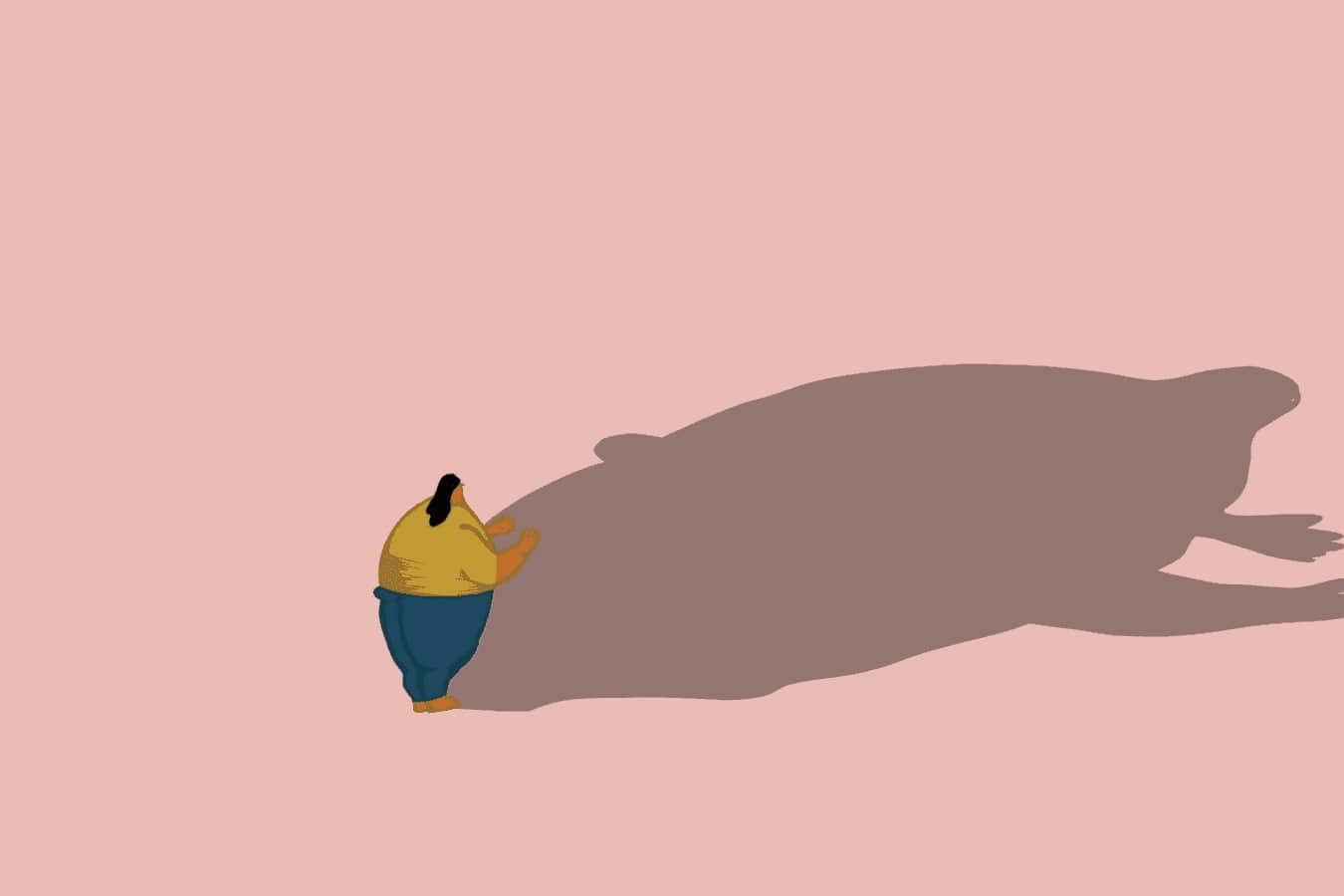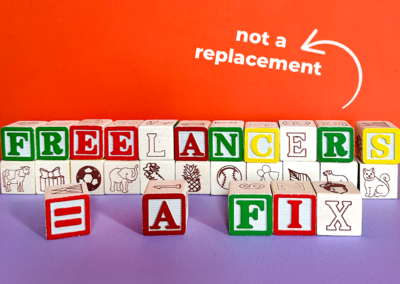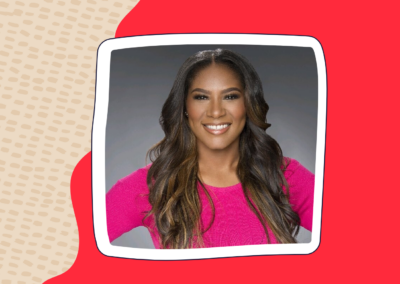As storytellers, we are constantly asked to tell our client’s stories. To tap into special truths and to connect on a human level. But what if we don’t even feel comfortable owning our own stories, how can we truly do the work our clients need us to do—or more importantly, do the work the world needs us to do?
I’ve been a copywriter for fifteen years. But, I’ve been a storyteller my whole life. And I’m not just talking about the vignettes I scribbled in journals before I knew the power of punctuation, or the scenes I’d act out, casting toys and friends as co-stars on sun-drenched weekends. I’m talking about the stories I told myself about who I was and what was possible for me, well into my adulthood. The stories that framed my reality, influenced my experiences and lied to me about my worth.
For a long time, I let the stories I told myself keep me from telling my own story. But thanks to some amazing creative collaborators, some shadow work and a little help from the universe, I’ve learned that embracing my own story is key to doing the most important work of my career.
What is shadow work?
According to Swiss psychiatrist Carl Jung, our “Shadow” or “Shadow self” consists of the parts of ourselves that we choose to repress or hide, or the aspects of ourselves that we feel shame around. “Shadow work is an introspective psychological practice leads to greater authenticity, creativity, and emotional freedom.”
Why should creatives do shadow work?
- Shame is a creativity killer. It prevents us from tapping into our true and complete selves—which keeps us from creating with the magic of who we really are. It seeps into our subconscious, encouraging us to hide aspects of ourselves the world might not deem lovable, reject parts of us that make us different. When we let shame reshape our narrative, we are not the masters of our own stories.
- Your authenticity is your superpower. Authenticity asks us to accept and incorporate all parts of ourselves. And when we lose our authenticity, our work and the world loses, too. Because as creators, we’re not just shaping our own realities with the stories we tell (or choose not to tell), we’re shaping the world we live in.
- Empathy begins and ends with you. As creative professionals, empathy is required to do our job well. It helps us connect with others and create the story threads that bring brands to life, solve problems and sell solutions. But if we can’t have empathy for ourselves and our own experiences, if we can’t embrace the humanity of our own realities, how can we have it for others? For our clients? For the creative process itself?
Creative Expression as Shadow Work
As creators, our shadow selves are pivotal to the work our souls are called to do. So as an activist and a creative, doing shadow work has been key to my healing journey as a person and a mother, but it’s also been foundational to creating buzz-worthy, career-shaping, purpose clarifying work. For me, creating has always been a process of self-acceptance and self-love—so it’s become a huge part of my own process when it comes to outing and owning my shadow. I’ve always been drawn to create solutions that normalize and neutralize the things that make me feel other. And every time I overcome my own inner critic to incorporate what bubbles up for me, it helps me to embrace myself—and make beautiful work and positive change—both in myself and out in the world.
Belonging and Next Creative Leaders
As an adopted person, your very first experience is one of rejection. So I’ve carried shadow around not belonging for a very long time. And though I was pretty good at hiding that part of myself by being an extrovert and “collecting” family and friends, it makes sense that I’d pick a career where I’d feel like an outsider.
I wasn’t comfortable acknowledging it to myself at the time, but Next Creative Leaders was born out of my own deep (and often unrequited) desire for belonging in our industry and in this world. By creating a platform that celebrates the unique way women (and non-binary) talent lead in a world that is male by default, I wasn’t just helping re-write a narrative that kept women from being seen as creative leaders, I was writing a love note to the part of me that was powerfully “other.” I was creating community where I’d once felt alone. I was celebrating others in a way I’d yet to feel celebrated myself. And through co-founding Next Creative Leaders, I’ve found my own unique voice as a non-traditional leader.
Sexuality and #ThisIsFamily
In the late eighties, I lost my cousin to suicide. The adults whispered about his AIDs diagnosis and hid his name in a Christmas gift for my grandmother, “out of respect.” At the time, I was much too young to really understand sexuality. But I was left with the vague notion that he had liked boys, and that had somehow made him sick. Before I even knew what it meant, sexual “otherness” became equated with secrecy and grief. It’s not surprising that I would reject my own sexual otherness for so many years. I didn’t feel comfortable exploring my interest in women until my twenties. And it took me leading an award-winning, global Pride campaign for Google before I felt comfortable outing myself as queer/bisexual.
By shaping a global narrative and creating a physical and emotional safe space, I could really embrace the full spectrum of my sexuality. #ThisIsFamily isn’t just a campaign that challenges us to redefine traditional viewpoints, it’s my family story. It’s a love note to non-traditional families. To finding belonging in unexpected places and with unexpected people. And it’s a celebratory homecoming to the community who welcomed me, before I could accept myself.
Mental Health and Our Silent Partner
I developed an eating disorder as a coping mechanism for my anxiety when I was twelve. And though I experienced the symptoms of anxiety throughout my teens, I wasn’t officially diagnosed with Generalized Anxiety Disorder until I was 19. Even though anxiety had always been a part of my achiever experience, I carried shadow around the fact that I had a mental health diagnosis. I worried it would make people think I was less capable. And as a professional, I worried my diagnosis would give people one less reason to see me as a leader—something I desperately wanted.
Though I have been pretty vulnerable as an advocate over the past few years, I had a lot of resistance around outing my mental health “shadow”—especially with my professional community. It took a global pandemic (and the brave partnership I found Victoria Rosselli) to get me to share my own experience with Our Silent Partner—and help start an important conversation about creativity and mental health.
The work you’re meant to do is waiting. So is the world.
If you’re dreaming about doing work that matters—it might be time to start with yourself. Shadow work frees you up to tell the stories the world needs you to tell. So find your brave and embrace your state of becoming.
Some tools for exploring shadow work:
- This program: To Be Magnetic (Unblocked Shadow + Unblocked Inner Child workshops)
- This book: The Dark Side of the Light Chasers
- These flower remedies can help heal old emotional wounds



